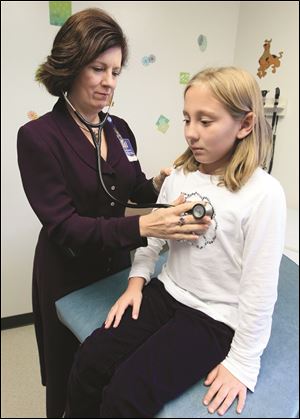
Debate reignites on tests of children's cholesterol
Critics say drug-industry ties influence study
7/23/2012
Dr. Elaine Urbina examines Joscelyn Benninghoff, 10, at Children's Hospital in Cincinnati. Joscelyn takes medication to control her cholesterol.
CHICAGO -- Should all U.S. children be tested for high cholesterol?
Doctors are still debating that question months after a government-appointed panel recommended widespread screening that would lead to prescribing medicine for some children.
Fresh criticism was published online today in Pediatrics by researchers at one university who said the guidelines are too aggressive and were influenced by panel members' financial ties to drug makers.
Eight of the 14 panel members reported industry ties, and they disclosed that when their advice was published in December.
They contend in a rebuttal article in Pediatrics that company payments covered costs of evaluating whether the drugs are safe and effective but did not influence the recommendations.
Even so, the ties pose a conflict of interest that "undermines the credibility of both the guidelines and the process through which they were produced," said the commentary by researchers at the University of California at San Francisco.
The authors are Dr. Thomas Newman, a researcher and former member of a Food and Drug Administration pediatrics advisory committee, and two heart disease researchers, Drs. Mark Pletcher and Stephen Hulley.
Other criticism was published earlier this year in the Journal of the American Medical Association. That critique raised concerns about putting children on cholesterol drugs called statins, noting that the medicine has been linked with a rare muscle-damaging condition in adults.
The guidelines are endorsed by the Academy of Pediatrics, which publishes the journal that carried the critical commentary today.
The panel recommends that all U.S. children should get blood tests for high cholesterol as early as age 9 and that testing should begin much earlier for children at risk of future heart disease, including those with diabetes or a family history of heart problems.
Treatment generally should begin with lifestyle changes including diet and exercise, the guidelines say.
Cholesterol drugs would be recommended for some children, but probably fewer than 1 percent of those tested. But the advice said those drugs, including statins, shouldn't be used at all in children younger than 10 unless they have severe problems.
The guidelines aim to help prevent and treat conditions in children that put them at risk for later heart-related problems.
At least 10 percent of U.S. children have unhealthy cholesterol levels and one-third are overweight or obese.
The dispute may leave parents wondering whether to have their children screened.
Dr. Sarah De Ferranti, an American Academy of Pediatrics spokesman and director of preventive cardiology at Boston Children's Hospital, said the question should be part of a conversation parents should have with their pediatrician about heart disease risks, including weight, blood pressure, and lifestyle.